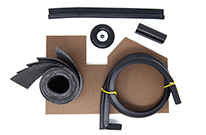
Image source: planetforward.ca
Doug Sharpe
President of Elasto Proxy
Chennai, India generates hundreds of tons of plastic waste every day. Plastic bags like the ones used at take-out counters in local restaurants are used briefly and then discarded. Eventually, this plastic waste finds its way to landfills, where it can remain for hundreds of years.
“We have spoiled the entire world with plastic,” says T.S. Shankar, Director of Biotech Bags. His Chennai company has yet to turn a profit, but Shankar prides himself on making bags from what CNN calls “the world’s first 100% biodegradable plastic.”
Biodegradable Plastic Bags
Biotech Bags cost more, but clients such as Kentucky Fried Chicken in Mumbai are willing to pay the higher price. The environmentally-conscious owner of Sangeetha Restaurants also wants customers to understand how Shankar’s technology works, and prints a brief description of it on the bags themselves.
As customers can learn while enjoying a quick meal, Biotech Bags contains an enzyme that acts as a catalyst when the material comes into contact with soil. Within six months, the plastic bag degrades completely and, according to CNN, leaves no “toxic” residues behind.
Compostable Bioplastic Bags
Shankar’s technology is impressive, but other entrepreneurs are replacing petroleum-based plastics altogether. BioBag is a U.S. and Canadian company that makes shopping bags, commercial liners, and packaging films from plants and vegetable oils instead of polyethylene (HDPE, LDPE, and LLDPE).
Because micro-organisms that live in the soil consume plant-based materials, BioBag products are both biodegradeable and compostable. The company’s claims comply with California law as well as ASTM D6400, a standard specification for the labeling of plastics designed for aerobic composting in municipal and industrial landfills.
Government Regulation and Job Creation
California isn’t the only place that regulates “green marketing”, and cities like Los Angeles aren’t the only municipalities that restrict or even ban plastic bags. Here in Quebec, shoppers in the town of Deux Montagnes (Two Mountains), must ask for papier or bring their own recyclable bags. In other Canadian communities, plastic bags are available for a small fee.
According the Plastic Bag Ban Report, U.S. communities from coast-to-coast are following suite. In recent months, cities like Santa Fe, NM and villages like Great Barrington, MA have banned thin-film, single-use plastic bags. At the same time, Cereplast – another California company that makes bioplastic bags – may need to boost production to meet international demand from India and Italy.
Petroleum-Based Plastics and Carbon Nanotubes
In Australia, researchers at the University of Adelaide have developed a nanotechnology process that could trump the efforts of companies like Cereplast, BioBag, and Biotech Bags altogether. Using what Dr. Dusan Losic calls “nanotechnological recycling,” professors at the School of Chemical Engineering have found a way to convert non-biodegradeable plastic bags into carbon nanotubes.
Hundreds of times stronger than steel, carbon nanotubes are comparatively lightweight materials with unique electrical, mechanical, and thermal transport properties. Today, applications include electronics, energy storage, wind turbines, and sensors. By recycling polyethylene plastic bags into nanomaterials, applications could also include filtration and biomedical products.
Plastic Bags and the Environment
So are plastic bags ever “good” for the environment? The petroleum-based products from Biotech Bags may not pollute the soil, but do the compostable bioplastics from BioBag and Cereplast truly enrich it? If these biodegradable, compostable plastics wind up in landfills alongside other, harmful materials, how much is gained?
As manufactured products, all plastic bags require energy – and some of these energy sources may cause pollution. At the same time, manufactured products come from workplaces where employees earn paychecks and spend money that supports other industries and the people who work there.
Could recycling plastic bags into carbon nanotubes help the environment – and perhaps the economy – most of all? Or does our a continued reliance on disposable products inevitably lead to more pollution, especially in fast-growing parts of the developing world? I look forward to your comments.








